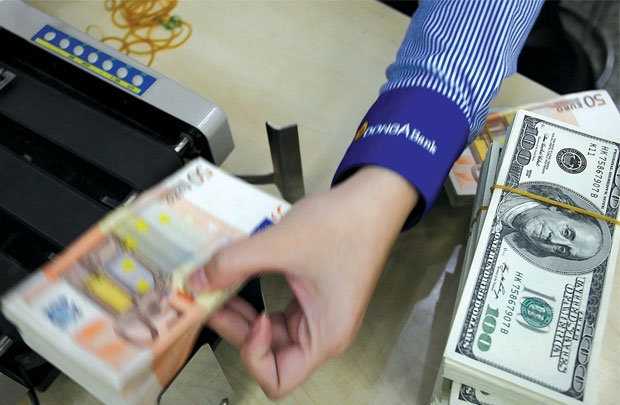
However, the exchange rate between the dong and other currencies have been fluctuating since June 2014. The dong has appreciated significantly over the euro and the Japanese yen.
A report showed that the euro depreciated by 8.8 percent against the dong in the first nine months of the year after the European Central Bank slashed the prime interest rate and announced several economic stimulus packages to deal with low inflation and slow growth.
Meanwhile, the Japanese yen lost 7.7 percent in the value against the dong. This is explained by the fact that the Japanese central bank continues loosening the monetary policies to cope with deflation.

The same thing is occurring with the South Korean currency as the won has depreciated by 7 percent against the dong this year.
According to Bui Hai Duong, a senior executive at Sacombank, the Vietnam dong has been appreciating against these foreign currencies thanks to the recovery of the US dollar.
Some businesses of S&P 500 have reported very satisfactory business revenue for the third quarter of the year. This helped US stocks soar to a two-week high and the 10-year bond yield climb to a one-week high.
Analysts noted that there are signs of the US Federal Reserves planning to raise the prime interest rate next year. The US Labor Department has recently reported that the average number of applications for unemployment benefits in the last four weeks dropped to the deepest low in 14 years.
The Purchasers Managers Index (PMI) released by Market Economic has reportedly decreased to the 3-month low in October. However, the news helped stop the continued decrease of the euro value against the US dollar only. Meanwhile, the euro’s downward trend against the dong still continues.
Vietnamese import companies have received big benefits from the dong appreciation. Hoa Sen Group, the steel manufacturer, has seen its share price increase rapidly by 4.34 percent, thanks to higher profits due to cheaper import materials from Japan. About two-thirds of the materials used in its products are from Japan.
Meanwhile, Vissan, CP and several food companies are rushing to import Australian beef and fruits to take full advantage of the Australian dollar depreciation.
Tareq Muhmood, ANZ Vietnam’s CEO, also noted that many businesses have had big profits thanks to the depreciation of foreign currencies, not because of the improved business performance.
The CEO has also confirmed that more businesses have recently asked for bank loans to import goods from Australia.






- Vietnam GDP expands by 7.09% in 2024
- Vietnam stock market set to accelerate in 2025: Experts
- Vietnam stock market aims for emerging status by 2025: Finance minister
- Vietnam set to extend VAT cut for six months
- Vietnam’s credit growth projected to expand by 16% in 2025
- Regional, international financial centers mean boosters to Vietnamese economy: Deputy PM
